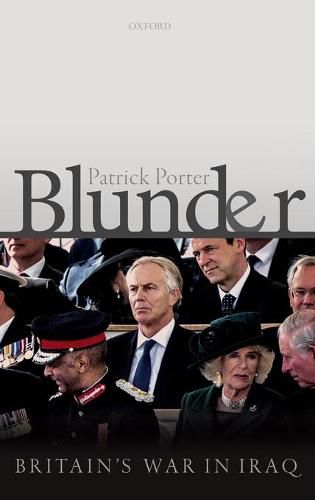Readings Newsletter
Become a Readings Member to make your shopping experience even easier.
Sign in or sign up for free!
You’re not far away from qualifying for FREE standard shipping within Australia
You’ve qualified for FREE standard shipping within Australia
The cart is loading…






This book is the first post Chilcot history of Britain’s decision to go to war in Iraq in March 2003. Deploying the large number of primary documents and retrospective testimonies of participants, Blunder reconstructs the assumptions underlying decisions, the policy ‘world’ that participants inhabited 2001-2003, and the way decisions were made. Contrary to much of the existing literature, this book puts ideas in the centre of the story. As the book argues, Britain’s war in Iraq was caused by bad ideas that were dogmatically held. Three ideas in particular formed the war’s intellectual foundations: the notion of the undeterrable, fanatical rogue state; the vision that the West’s path to security is to break and remake states; and the conceit that by paying the blood price , Britain could secure influence in Washington DC. Beyond fixations with dodgy dossiers , the flaws of individual leaders or intelligence failure, Iraq was a real ideological crusade, made by people who were true believers. These issues matter, because although the Iraq war happened fifteen years ago, it is still with us. As well as its severe consequences for regional and international security, the ideas that powered the war persist in western security debate. If all wars are fought twice, first on the battlefield and the second time in memory, this book enters the battle over what Iraq means now, and what we should learn.
$9.00 standard shipping within Australia
FREE standard shipping within Australia for orders over $100.00
Express & International shipping calculated at checkout
This book is the first post Chilcot history of Britain’s decision to go to war in Iraq in March 2003. Deploying the large number of primary documents and retrospective testimonies of participants, Blunder reconstructs the assumptions underlying decisions, the policy ‘world’ that participants inhabited 2001-2003, and the way decisions were made. Contrary to much of the existing literature, this book puts ideas in the centre of the story. As the book argues, Britain’s war in Iraq was caused by bad ideas that were dogmatically held. Three ideas in particular formed the war’s intellectual foundations: the notion of the undeterrable, fanatical rogue state; the vision that the West’s path to security is to break and remake states; and the conceit that by paying the blood price , Britain could secure influence in Washington DC. Beyond fixations with dodgy dossiers , the flaws of individual leaders or intelligence failure, Iraq was a real ideological crusade, made by people who were true believers. These issues matter, because although the Iraq war happened fifteen years ago, it is still with us. As well as its severe consequences for regional and international security, the ideas that powered the war persist in western security debate. If all wars are fought twice, first on the battlefield and the second time in memory, this book enters the battle over what Iraq means now, and what we should learn.